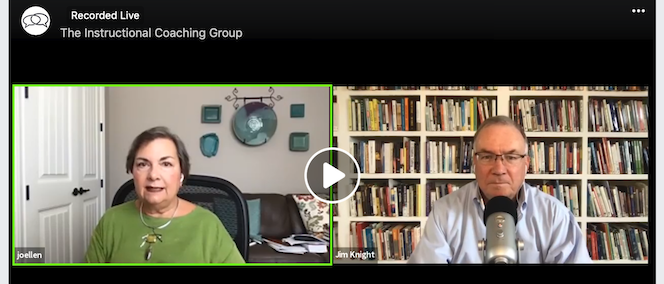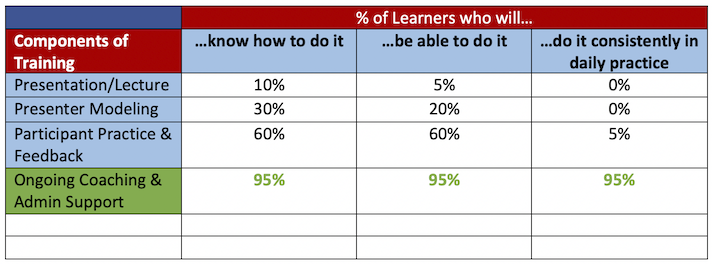 One of the silver linings of social distancing is the abundance of fresh professional resources available to every educator via the internet. Wonderful content is being created by expert colleagues whose energetic minds never stop looking for ways to engage and share what they’re learning.
One of the silver linings of social distancing is the abundance of fresh professional resources available to every educator via the internet. Wonderful content is being created by expert colleagues whose energetic minds never stop looking for ways to engage and share what they’re learning.
I took advantage of one of these “pandemic products” recently when I joined a Facebook Live discussion between Jim Knight and Joellen Killion on coaching.
Most educators in ABPC’s professional networks know Jim from his research and writing on instructional coaching. And many of you know Joellen from her leadership at Learning Forward and her evaluations of the Alabama Best Practices Center’s work.
Over the years, I have been blessed to interact and learn from both of these brilliant minds, and I consider the two of them to be among my most impactful mentors. So, it was with great anticipation that I joined their discussion, and I was selfishly pleased that Joellen’s “wanderlust gene” (which she mentions) was temporarily corralled by the lockdown, long enough for master interviewer Jim Knight to draw out some of her deep insight.
What is Coaching?
Early in the conversation, Jim asked Joellen for her definition of coaching. Scribbling as fast as I could, I caught the gist of her definition (you’ll find the complete interview link below):
Coaching is the process of personal and/or professional growth that unpacks and helps discover the inner teacher so we can reach our potential and affect the environment in which we work.
Jim agreed and made the connection to learning: Learning is all about acquiring knowledge and changing the way a person thinks and learns. Building on that idea, he speculated that reflection can be a form of someone coaching themselves.
Coaching Characteristics
The dialogue then shifted to the characteristics of an effective coach. Joellen began with stressing the non-negotiable characteristic: having the right disposition, one who approaches the job as a learner and a partner. She told Jim that she would hire a coach not for what s/he knows and is able to do, but for their dispositions. “With the right attitude and disposition, a prospective coach can learn the knowledge and skills related to that role.”
Other coaching characteristics relate to expertise: teaching expertise, content expertise, curriculum expertise, relationship expertise, communication expertise, coaching expertise, and leadership expertise.
The Many Roles of a Coach
Jim next shifted the dialogue to the many roles a coach may have. Both Joellen and he pointed to the important fact that each school has different needs. Accordingly, the principal and coach should identify the top three or four coaching roles based on that school’s priorities and district needs. The roles include:
- Resource provider
- Data coach
- Instructional specialist
- Curriculum specialist
- Classroom supporter
- Mentor/Mentoring
- Learning facilitator
- School leader (leading with attitudes, actions, and words)
- Catalyst for change
- Learner
The Impact on Professional Learning
One of the most intriguing parts of Joellen and Jim’s dialogue related to what they saw as the different between professional development and professional learning. Joellen suggested that professional development was an event where participants were in a place together to learn a particular practice or concept. Professional learning, on the other hand, focuses both on the skill development and the learning that makes us grow, changes and improves us, and is ongoing.
As I thought about this dialogue, I was reminded of the Showers and Joyce data about what causes adults to change practice (data that underscores the value of coaching programs):
Evaluating Professional Learning
Toward the end of the dialogue, Jim broadened the conversation to include evaluating professional learning, another area of Joellen’s expertise. He mentioned the KSAB, or being clear about what’s changing related to Knowledge, Skill; Aspiration, and Behavior.
Joellen suggested two important questions when evaluating professional learning:
- How are you changing your practice as a teacher as a result of this professional learning?
- What is the evidence of improved student learning?
She also noted the importance of focus: Are you evaluating coaching or the coach?
Coaching ‘Light’ or Coaching ‘Heavy’?
Finally, they discussed the challenge of coaching “heavy” versus coaching “light.” Coaching light might include building a relationship with the teacher, finding resources, or filling in for a class when the teacher attends a professional learning. If a coach stays in the “light” field, s/he may not impact that teacher’s practice.
Moving to coaching “heavy” involves discussions about changing practice, setting goals, and measuring progress, which often is more challenging but can reap rich rewards for the teacher and for students. Many coaches begin with coaching light and move to coaching heavy as the relationship and trust is built and strengthened.
My Thursday evening was enriched by this dialogue and I am exceedingly grateful to both Jim and Joellen for sharing their insights with me and the many others who value their work and advice and will now have the opportunity to listen as these world-class experts talk about the art and science of coaching.
Link to the interview:
https://www.facebook.com/instructional.coaching/videos/1651986124969791
Also see:
A story at Jim’s blog highlighting Joellen’s thoughts on coaching roles.



Thinking about your school or district, which coaching roles do you believe to be the most relevant?
I was particularly interested in the comparison of “light” and “heavy” coaching and the prospect of successful coaches moving to deeper interactions as trust builds and relationships mature.